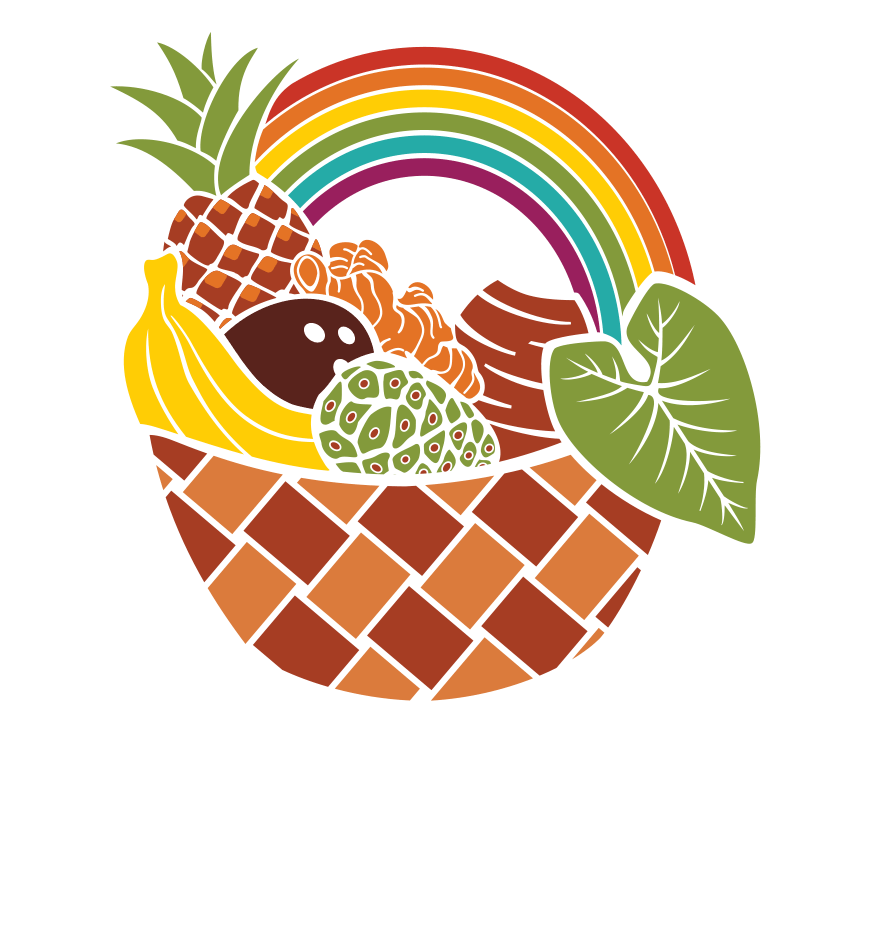Last Updated: 3/25/2025
Please note: Malama Da Farmer Grants is administered only in Hawaiʻi County.
The Food Basket is excited to announce our new funding opportunity for Hawaiʻi Island food producers called Malama Da Farmer Grants! These grants aim to support economic recovery of small food producers whose businesses were financially impacted by the COVID-19 pandemic.
Funding Source
Funding for this program was provided by the County of Hawai‘i and originated from the U.S. Department of the Treasury’s State and Local Fiscal Recovery Funds (SLFRF) Program authorized by the 2021 American Rescue Plan Act (ARPA). The Food Basket Inc. is the sub-recipient.
Purpose of Funding
The SLFRF Program was authorized by the American Rescue Plan Act. The County of Hawaiʻi awarded SLFRF funds to The Food Basket, through a competitive process, to administer a Local Food Producer Expansion Program (LFPEP). The primary goal of LFPEP is to drive a significant increase in local food production by providing essential support to eligible small businesses and nonprofits interested in expanding their operations.
For Applicants and Reviewers:
Deadline to apply: April 7, 2025 by 11:59 PM HST
Total Program Funding: $710,000
Range of Grant Awards: $5,000-$25,000
Contact:
malamadafarmer@hawaiifoodbasket.org
or call 808-437-3044
Fillable MDF Grant Application Worksheet
Fillable MDF Grant Application Worksheet (Korean)
Instructions: This worksheet is not required to submit a 2025 Malama Da Farmer Grant Application. You may use this worksheet to preview the grant application questions and to draft your responses. Grant applications will only be accepted through the online SurveyApply grant portal.
The Request for Application (RFA) is your friendly guide to help you work through your application.
Eligibility Requirements
Applicants must register and attend, or watch a recording of, at least one of the five webinars in the “Malama Da Farmer: Planning to Scale Webinar Series” hosted by GoFarm Hawaiʻi. Please register at gofarmhawaii.org.
Applicants must be a small business or nonprofit involved in agricultural food production since at least March 1, 2020. The agricultural operation must correspond to one or more six-digit North American Industry Classification System (NAICS) codes beginning with either 111 (Crop Production) or 112 (Animal Production and Agriculture). Please view the eligibility requirements in the RFA.
Frequently Asked Questions
-
If you were unable to attend the live GoFarm-hosted webinar series “Planning to Scale,” you can still fulfill this requirement by watching one of the five recorded sessions of your choice. After viewing, in the online application select ʻI did not attend any of the live webinars. I only watched a recordingʻ and answer five questions listed in the application.
Watch a webinar of your choice by following this link: -
GoFarm
info@gofarmhawaii.org
Rachel Fukumoto
OACA
rachel@oachurcd.orgMargo Shiroyama
The Kohala Center
mshiroyama@kohalacenter.org
Megan Steiner
The Kohala Center
msteiner@kohalacenter.org
Kelly Teamey
kellyteamey@gmail.com
Anna Ezzy
County of Hawaiʻi
anna.ezzy@hawaiicounty.gov -
malamadafarmer@hawaiifoodbasket.org
or
808-437-3044
Ask for Alex or Chelsea -
Proof of Status:
Self-attestation in online grant application of the following:Have no more than 500 employees
Must be independently owned and operated
Not be dominant in its industry
Proof of Agricultural Activity Within Any Timeframe Between
March 1, 2020 to March 3, 2021:2020 Schedule F (Form 1040) Profit of Loss from Farming Note: the NAICS code does not need to appear in the form.
OR
A legal document stating six-digit North American Industry Classification System (NAICS) code beginning with 111 or 112, such as one of the following documents:
Business Eligibility Requirements
Applicants must have been in business since at least March 1, 2020, as shown on their General Excise (GE) Tax License issued by the State of Hawaiʻi Department of Taxation. To meet this requirement, the GE Tax License must indicate:
An issue date on or prior to March 1, 2020
Applicants must provide proof of address in Hawaiʻi County since at least March 1, 2020. If none of the required legal documents (i.e. Proof of Status, Proof of Agricultural Activity, or GE Tax License) show a Hawaiʻi County address, a supplemental legal document may be submitted. The supplemental document must show (1) the business name or organization name of the applicant, (2) a Hawaiʻi County address, and (3) a date on or prior to March 1, 2020.
-
Proof of Status:
IRS non-profit determination letter in online application dated on or prior to March 1, 2020
Proof of Agricultural Activity Within Any Timeframe Between
March 1, 2020 to March 3, 2021:
2020 Form 990 must be submitted, with or without the supplemental Schedule O.The forms must contain a description of the organization’s agricultural activity. Note: the NAICS code does not need to appear in the forms.
Business Eligibility Requirements
Applicants must have been in business since at least March 1, 2020, as shown on their General Excise (GE) Tax License issued by the State of Hawaiʻi Department of Taxation. To meet this requirement, the GE Tax License must indicate:
An issue date on or prior to March 1, 2020
Applicants must provide proof of address in Hawaiʻi County since at least March 1, 2020. If none of the required legal documents (i.e. Proof of Status, Proof of Agricultural Activity, or GE Tax License) show a Hawaiʻi County address, a supplemental legal document may be submitted. The supplemental document must show (1) the business name or organization name of the applicant, (2) a Hawaiʻi County address, and (3) a date on or prior to March 1, 2020.
-
Q: We established our Hawaiʻi GE Tax License prior to the COVID-19 pandemic, but we moved to Hawaiʻi County in 2023. Are we eligible for this grant?
A: No, eligibility requirements include that the farm was operating in Hawaiʻi County during the COVID-19 impact period of March 1, 2020 to March 3, 2021. Eligibility will be determined based on the Eligibility Requirements in the Request for Applications.Q: I established my Hawaiʻi GE Tax License prior to the COVID-19 pandemic but transitioned this year to a single-member LLC? Is my business eligible for this grant?
A: The business structure or a change in business structure does not affect eligibility. Eligibility will be determined based on the Eligibility Requirements listed in the Request for Applications, which includes that the GE Tax License was issued on or prior to March 1, 2020.Q: If we are currently farming under a different North American Industry Classification System (NAICS) code than in 2020, are we still eligible?
A: Current farming activities do not affect eligibility. Eligibility will be determined based on the Eligibility Requirementslisted in the Request for Applications, which include proof of agricultural activity corresponding to NAICS codes beginning with 111 or 112 during the COVID-19 impact period March 1, 2020 to March 3, 2021.
Q: My original business established prior to the COVID-19 pandemic is no longer my primary farm income. My primary farm income now comes from a new business entity established this year. Does this impact eligibility?
A: No, the new business entity does not affect eligibility. Eligibility will be determined based on the Eligibility Requirements listed in the Request for Applications, which include proof of agricultural activity corresponding to NAICS codes beginning with 111 or 112 during the COVID-19 impact period March 1, 2020 to March 3, 2021. The GE Tax License for the original business entity should be uploaded into the application portal for review because this is the business that was active during the COVID-19 impact period.
If the business name entered in the Applicant Profile does not match the GE Tax License, we may require additional documentation linking your name to both the old entity and the new entity. This ensures that the eligibility criteria are met and prevents fraudulent use of a business name or GE Tax License by someone who does not own it.
-
Q: Will technical assistance (TA) be available for the duration of the grant period?
A: As a condition of receiving a Mālama Da Farmer Grant, grantees must schedule and complete a one-hour consultation session with a technical assistance provider within the first three months of the grant period, from June 1 to August 31, 2025. However, there are TA providers in the community who are available to support farmers on a regular basis. You are encouraged to take advantage of these valuable resources that are available to assist farmers. The Food Basket maintains a listing of farmer TA providers on our Mālama Da Farmer webpage.
-
Q: Would an activity such as planting trees in 1 gallon pots be considered disturbing the soil and trigger additional review?
A: The Mālama Da Farmer Grant administrators are not monitoring grantee activities that “disturb the soil,” and we do not have the authority to make this determination or to determine whether an activity will require additional permits or review by another regulatory agency. The Mālama Da Farmer Grant administrators will not be implementing any procedures to report grantee activities to other regulatory agencies, including to other County departments. Grantees are expected to remain in compliance with all Federal, State and County laws. The purchase of 1 gallon pots and trees are allowable costs under the Mālama Da Farmer Grant.
Q: Is $5,000 the maximum amount for any single item purchased through the grant?
A: A “single expense item” for the purpose of this grant refers to a budget line item that would take up a row in the requested budget, such as “Seeds” or “Animal Feed.” The maximum limit for what you can budget in any “single expense item” is $25,000, which is also the maximum of the grant total that can be awarded.
In general, a $5,000 “per unit cost” threshold is used to determine whether a physical item is a “supply” or “equipment.” As of January 28, 2025, the Mālama Da Farmer Grant administrators verified with the County of Hawaiʻi that equipment is an allowable cost. Physical items with a per unit cost of $5,000 or more should be listed in the equipment budget category.
For example, animal feed should be entered as a supply budget item because its unit cost is less than $5,000. If the animal feed is sold in units of 40 lbs bags, the 40 lb bag cannot cost $5,000 or more. An applicant can potentially request a $25,000 grant for animal feed.
Q: If I propose purchasing an item for $2,500 in my grant application, but the price changes later, can I adjust the budget?
A: Adjustments are allowed but must be approved by the grant administrator, The Food Basket, prior to making purchases under the revised budget.
Q: I have a multi-farm operation where I grow both flowers and edible crops. Will this affect the grant? Can I focus the funds on my edible crops?
A: Having a multi-farm operation will not affect your eligibility for the grant. However, the focus of the grant is on increasing food production, so the grant funds should be used for activities and projects related to scaling the production of edible crops.


